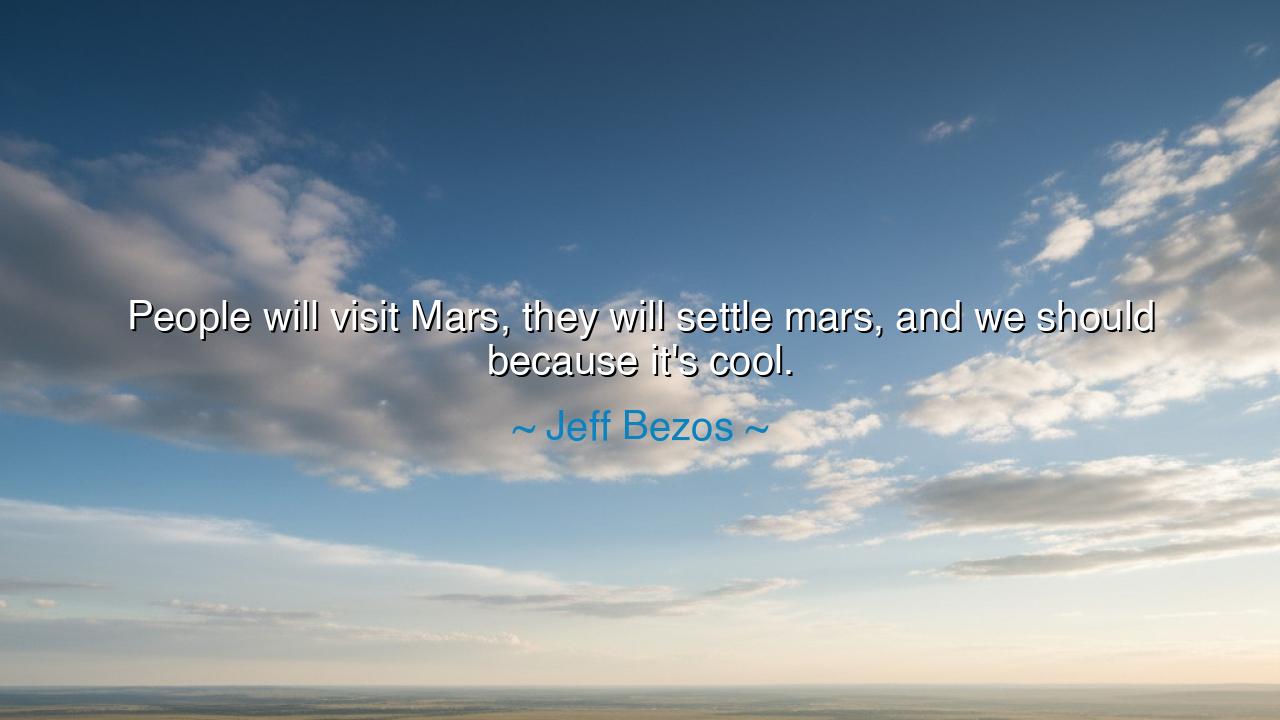
People will visit Mars, they will settle mars, and we should






"People will visit Mars, they will settle Mars, and we should because it's cool." These words spoken by Jeff Bezos echo the timeless human quest for exploration and discovery. From the earliest days of civilization, humans have always looked to the stars with a sense of wonder, imagining what lies beyond the horizon. Bezos, in his modern vision of humanity’s future, encapsulates the age-old human desire to not only explore the unknown but to settle and conquer new frontiers. His statement is both a declaration of possibility and a call to action, urging us to recognize that the future of humanity is bound to progress, to stretch beyond the limits of the known, and to shape a future that goes beyond the familiar bounds of our Earthly existence.
In the ancient world, exploration was seen as both a noble and heroic endeavor. The Greeks celebrated the idea of the hero’s journey, where the hero would venture beyond the safety of their homeland to seek wisdom, glory, or truth. One of the greatest explorers in history, Odysseus, embodied this spirit of adventure and curiosity in Homer’s Odyssey. Though his journey was fraught with danger, hardship, and loss, Odysseus' pursuit of knowledge and his desire to return home defined the core of his character. Like Odysseus, Bezos’ vision of the settlement of Mars reflects a deep yearning to go beyond the known, to face the unknown challenges, and to expand the boundaries of human existence. In this light, Bezos’s statement is not merely about visiting a distant planet, but about embracing the unknown in the same way the ancients embraced their voyages into the unknown.
The Romans also understood the importance of pushing beyond their borders, though for them, it was more about expansion and conquest. Julius Caesar’s campaigns to expand the Roman Empire were driven by an ambition to not only control land but to extend the reach of civilization itself. His famous crossing of the Rubicon is often seen as the moment he stepped beyond the known and embraced the unknown—an irreversible commitment to reshape history. Similarly, Bezos' vision of colonizing Mars is an act of stepping into the unknown with boldness, ambition, and the desire to build a future that transcends current limitations. Just as Caesar's empire reshaped the world of his time, so too does Bezos see Mars as the next frontier for humanity’s legacy.
In more recent history, the Renaissance provides an example of the transformative power of human curiosity and exploration. Leonardo da Vinci and other figures of the period were driven by a relentless desire to explore not only the physical world but the very nature of the universe. Da Vinci’s ideas about flight, anatomy, and engineering all stemmed from his insatiable curiosity—a desire to reach beyond what was known and to shape a future grounded in discovery and understanding. Bezos' vision of Mars can be seen as an extension of this spirit of innovation, seeking to push the boundaries of human existence in the same way the Renaissance thinkers sought to expand the frontiers of knowledge.
The dream of Mars is also intimately connected to humanity’s desire to survive and flourish in an ever-changing world. The space race of the 20th century, epitomized by the Apollo 11 mission and the historic moon landing in 1969, demonstrated the power of human ingenuity and the ability to achieve the seemingly impossible. Neil Armstrong's first steps on the moon were not just a technical achievement; they were a profound moment of human triumph—a demonstration that when humanity sets its sights on something greater than itself, it can achieve monumental change. Just as Armstrong stood on the surface of the moon, Bezos envisions humans not just visiting Mars, but settling it—transforming it from a distant, unreachable object in the night sky to a place of habitation and growth.
The lesson in Bezos’s quote is clear: the future is not a passive waiting for things to happen, but an active pursuit of new horizons. Whether on Earth or beyond, humanity’s greatest achievements have always been driven by a vision of possibility and a willingness to take risks in order to achieve greatness. This desire to explore and expand is the essence of progress—whether it be in science, technology, or philosophy. Like the ancients, who sought to understand the world through voyages, conquests, and intellectual pursuits, we must embrace the unknown and unseen with courage and determination.
In practical terms, we must learn to approach the future not with fear or doubt, but with a spirit of boldness and creativity. The dreams of the future are shaped not by waiting for them to unfold but by the actions we take today. We must cultivate curiosity, embrace challenges, and look to new possibilities with open minds and willing hearts. As we face challenges in our own lives, let us remember that Mars—like any great endeavor—was once seen as impossible. Yet, with determination and vision, it becomes not just a dream, but a potential reality. Be bold, dream big, and pursue the unimaginable, for it is in such pursuits that the future of humanity will truly be shaped.






AAdministratorAdministrator
Welcome, honored guests. Please leave a comment, we will respond soon